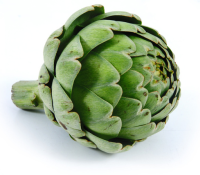Artichoke
 Overview
Overview
Artichokes, often referred to as globe artichokes, come from a plant called Cynara scolymus. This plant belongs to the same family as the sunflower and daisy. While the plant may grow to about four or five feet tall, the only part that is typically consumed is the large, unopened, purple and green flower: the artichoke. This flower consists of a tender heart surrounded by thick green leaves. Typically, the base of the leaves, which contain the “meat” that can be scraped off of the leaves, and the heart of the plant are the only parts that are eaten. It is important that the artichoke is harvested before the flower bud becomes mature; the more mature the flower, the tougher its leaves become, making it more difficult to eat. One plant may produce several different sizes of artichokes, the largest of which grow toward the top of the central stalk. Smaller, “baby” artichokes may grow toward the bottom of the plant and are used primarily for canned or jarred artichoke hearts.
Artichokes that are prime for consumption are characterized by thick, firm outer leaves that are closed tightly around the heart and may emit a squeaking sound if squeezed together; artichokes with leaves that are dry and beginning to spread apart are not at optimal freshness. While artichokes harvested in the fall and winter are characterized by an olive green color, artichokes harvested in the spring are a softer green.
History of Artichoke
Artichokes have been a stable part of many humans’ diet for a very long time. Ancient scholars, including the Greek historian Dioscorides and the Roman scholar Pliny, mentioned artichokes in their writings. Artichokes were originally produced primarily in Italy; Catherine de Medicis is responsible for introducing the artichoke into France. Explorers from both France and Spain then introduced the plant to the United States. However, Americans did not begin to grow artichokes in any significant fashion until the mid-1800s, first in Louisiana and eventually in the coastal regions of California.
Italy, Spain, and France, in that order, are the world’s leading producers of artichokes, accounting for about 80 percent of the world’s supply of artichokes. The location along the Mediterranean and consequent climate of these countries make them ideal regions for the cultivation of artichokes. Within the United States, 99 percent of artichokes are grown in Castroville, California.
Nutritional Information
Artichokes are typically high in dietary fiber and, depending on how they are prepared, low in calories. They contain a number of vitamins, minerals, and other elements that are crucial to the healthy functioning of the body including magnesium, potassium, calcium, iron, Vitamins A and C, and folic acid.
Health Benefits of Artichoke
Artichokes offer many health benefits and artichoke extract has long been popular in Germany because of such benefits. Caffeoylquinic acids, including cynarin, are the active ingredient in artichokes. These acids have been shown to decrease the HIV virus’s ability to reproduce, and thus may help fight the disease. These acids along with flavonoids also contained in artichokes are antioxidants, which help prevent damage to the body caused by free radicals and in doing so, help prevent diseases from developing.
Cynarin can also be linked to artichokes’ benefit of lowering cholesterol: artichokes have been shown to help lower levels of bad cholesterol (LDL) and even increase levels of good cholesterol (HDL). In one study, daily doses of cynarin led to a rather significant reduction in overall cholesterol as well as triglyceride levels.
Artichokes also help enhance the functioning of the liver. Artichokes increase the liver’s production of bile and allow bile and fat to flow more easily to and from the liver, which helps maintain the health of the liver. If bile does not flow effectively out of the liver and to the gallbladder, the liver is at a greater risk of damage. In turn, artichokes and artichoke extract may be helpful in the treatment of some liver diseases, including hepatitis.
Artichokes may be especially beneficial for people who suffer from diabetes as they help regulate blood sugar levels. Artichokes contain inulin, a type of carbohydrate, which slows down the digestion process. However, since inulin in artichokes breaks down into various sugars during any length of storage, the fresher the artichoke, the more potent the inulin. Artichokes have been shown to help overall digestion, including reducing problems of nausea, abdominal pain, and bloating: in one study, 85 percent of participants who took an artichoke extract experienced significant decreases in such digestive problems.
Artichokes may be helpful in treating numerous other conditions including urinary tract problems, gout, arthritis, and rheumatism.
References
- Holford, P. The optimum nutrition bible, Little Brown Group (2004)
- Holford, P & Lawson, S. Optimum Nutrition Made Easy How to achieve optimum health, Piatkus Books (2008)
- Murray, M.T. et al., Encyclopedia of healing foods, London : Piatkus (2005)
- The National Research Council. Recommended Dietary Allowances, 10th ed, National Academy of Sciences (1989)
- Werbach, M. Nutritional Influences on Illness, 2nd ed, Third Line Press (1993)
Posted in Artichoke
Ask a Question Or Join a Discussion


